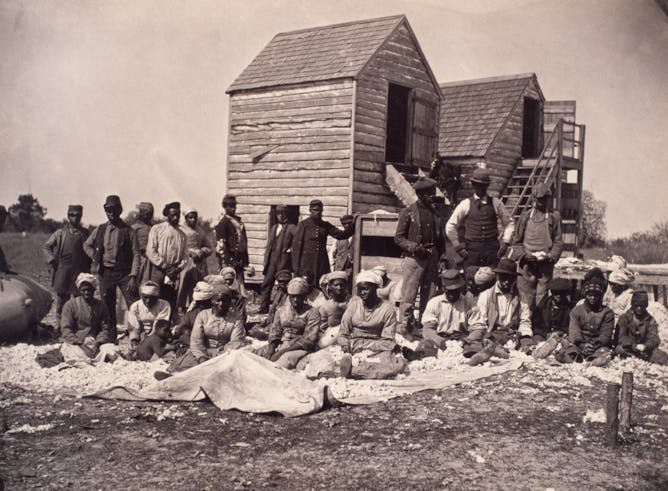|
In 1865, newly freed slaves were promised “40 acres and a mule.” Spoiler: It never happened. Instead, for the next 150 years black Americans were robbed of a fair share of the land they lived on. Black farmers now own far fewer acres than they did a century ago, while the racial homeownership gap is at its widest in decades.
Tufts urban planning expert Julian Agyeman and North Carolina State landscape professor Kofi Boone explore the history and suggest a 21st-century “black commons” – communal digital and land resources held for the benefit of all African Americans – might address this vestige of slavery.
Also today:
|
Matt Williams
General Assignments Editor
|

|
|

Former slaves harvesting for their own profit.
Corbis via Getty Images
Julian Agyeman, Tufts University; Kofi Boone, North Carolina State University
Black farmers own far less land than they did in 1910 and the racial gap in homeownership is at the highest level for 50 years.
|
Environment + Energy
|
-
Rachel Morello-Frosch, University of California, Berkeley; Joan A. Casey, Columbia University Medical Center; Kathy Tran, University of California, Berkeley; Lara Cushing, San Francisco State University
A new study finds an association between living near active oil and gas wells in California and low birth-weight infants, adding to findings elsewhere on health risks from oil and gas production.
|
|
Economy + Business
|
-
Brook Gotberg, University of Missouri-Columbia; Paige Marta Skiba, Vanderbilt University
Bankruptcy is meant to offer breathing space to struggling companies, but it may not be enough given the unpredictable nature of the pandemic.
-
Heidi Peltier, Boston University
The Trump administration is rolling back environmental regulations, claiming it's good for the economy. But research shows that conservation is better both for public health and for job creation.
-
Julie Manning Magid, IUPUI
The US Supreme Court has ruled that the Civil Rights Act applies to LGBT people. A business law scholar explains why this is one of the most consequential discrimination cases in decades.
|
|
Education
|
-
Leana Bouffard, Iowa State University; Gaylene Armstrong, University of Nebraska Omaha
When it comes to making law enforcement professionals less likely to resort to use of force, higher education goes a long way, research shows.
|
|
Ethics + Religion
|
-
Allison Anna Tait, University of Richmond
On June 19, a court will decide whether Virginia must obey a 1890 deed that gave the state a plot of prime Richmond land as long as it would 'faithfully guard' the Robert E. Lee statue erected there.
|
|
Science + Technology
|
-
Catherine A. Sanderson, Amherst College
Psychologists have identified the characteristics of 'moral rebels' who make the tough choice to stand up for their principles in the face of negative consequences.
-
Steven Collicott, Purdue University
How do people in a special airplane flight get to float like there is no gravity – just like astronauts? An aerospace engineer explains.
|
|
Arts + Culture
|
-
Verna Kale, Pennsylvania State University
While the man the world knows as 'Papa' balanced the demands of parenting with his work, his letters and fiction offer a window into the depth of his paternal feeling.
|
|
Health
|
-
David J. Peters, Iowa State University
Being able to identify communities that are susceptible to the pandemic ahead of time would allow officials to target public health interventions to slow the spread of the infection and avoid deaths.
-
Claudia Finkelstein, Michigan State University
Father's Day is approaching, raising questions about the safety of visiting fathers and grandfathers. A doctor offers guidelines.
|
|
Politics + Society
|
-
Timothy Gitzen, University of Hong Kong
South Korea's mass surveillance to curb the coronavirus pandemic uses technologies and techniques that are grounded in anti-LGBTQ discrimination.
|
|
Most Read on Site
|
-
Douglas Reed, University of Pittsburgh
SARS-CoV-2 can be spread through the air. But just how much of a factor that is has been hard to determine. Recent evidence suggests it is common, posing problems as public places begin to reopen.
-
William Petri, University of Virginia
Public restrooms can be scary when it comes to coronavirus, and they get scarier when you look at how the virus spreads. A doctor explains how to stay safe when you're traveling and really gotta go.
-
JohnEric Smith, Mississippi State University
'Normal' body temperature varies from person to person by age, time of day, where it's measured, and even menstrual cycle. External conditions also influence your thermometer reading.
|
|
| |
| |
| |
| |
| |
| |
|
|